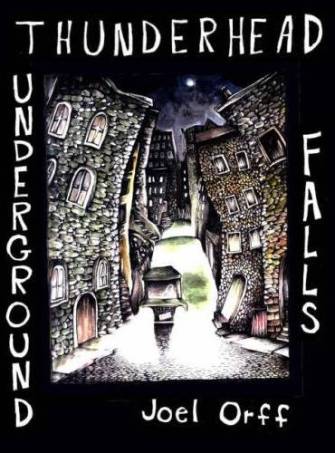
June 26, 2007
 CR Review: Thunderhead Underground Falls
CR Review: Thunderhead Underground Falls

 Creator:
Creator: Joel Orff
Publishing Information: Alternative Comics, soft cover, 128 pages, May 2007, $14.95
Ordering Numbers: 1891867881 (ISBN10), 9781891867880 (ISBN13)

Joel Orff's work has a rich, lovely quality that makes it difficult for me to make a rigorous appraisal of its overall worth. Orff seems fascinated by quiet moments of reflection and reverie, as well as the abandoned places and inarticulate fumbling that can provide certain occasions with a distinct, dramatic tension. In
Thunderhead Underground Falls he slips back and forth between scenes anchored by a night and morning a couple spends together before one of them ships off to basic training. Being immersed enough to notice when the pair stops rattling around their shared town and hits the road may be the key to the work. The protagonist is heading towards an unavoidable fate, something that can't be outpaced no matter how many miles are driven; he's really going nowhere. At the same time, sudden trips are a pleasure that will be fundamentally denied him in his new life.
Even with its road trip section,
Thunderhead Underground Falls presents itself as a series of tableaux rather than a propulsive narrative. The college town in which the couple finds themselves is shut down for the holiday. Most places lie covered in snow. A groups of items has been abandoned within view of the road. A friend is surprised with a sudden visit. A motel room fosters intimacy. My favorite scene finds the pair entering what seems to be an abandoned home and sitting in its living room, talking and looking at various items before being interrupted by the voices of people who were upstairs all along. Anyone's who has ever spent time with someone after hours, in a place that's otherwise locked up or closed, a location somehow totally out of sync with the rest of the world, will likely recognize themselves in some part of the story Orff tells. His art has improved as well, and Orff may remind some of a much less visually accomplished Richard Sala. There are fewer moments than in
Waterwise where the drawing seems over-stylized or lifeless. A few pages come close to captivating purely on visual terms, which is not something I might have believed seeing Orff's early work.
The existence of so much that's positive make the book's shortcomings more regrettable, as you want to like it and think more of it than proves possible by the time you close the cover. There's something fussy, almost mannered about the way Orff piles on the special effects and magical moments, like a television producer trying to foist a season's worth of plot elements into a single episode. This could be part of the point: young people trying to cram experience into a brief period of time, or perhaps it's an observation on how events collapse on each other in memory. Since it's portrayed in a clumsy sense that feels more like watching something be staged than naturally unfold, I'm not sure I can extend the benefit of the doubt. The fades and blending between moments, particularly the short ones like how the couple met but even the longer portrayal of the soldier as he goes off to war, also seem a bit overwrought for how little seeing those scenes rather than simply sensing them adds to the narrative. Hopefully in future books Orff will reduce the level of excess through which he pushes his poetic view of the world.
 posted 1:00 pm PST
posted 1:00 pm PST |
Permalink
Daily Blog Archives
November 2019
October 2019
September 2019
August 2019
July 2019
Full Archives


